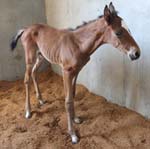Staff at the Charles Sturt University (CSU) Veterinary Clinical Centre in Wagga Wagga have had a mixed outcome for two horses burnt in the January fires that devastated large parts of NSW.
The two horses admitted for thermal injuries had around-the-clock intensive care which involved four times a day cleaning of their wounds and application of aloe vera and silver sulfadiazine ointment - a broad spectrum antibacterial agent and is also frequently used for the treatment of thermal injuries in humans. Pain relief was also administered daily.
The mare, ‘Casey’, responded well to treatment and her injuries were not as extensive as the younger filly ‘Call Me Miss Surprise’.
CSU Veterinary Clinical Centre Registrar in Equine Medicine, Dr Edwina Wilkes said the main concern for Casey was the thermal injuries to her udder and teats.
 “She gave birth to a filly foal on Monday 28 January and she had a ‘red bag’ delivery which is a term used to describe early placental separation,” Dr Wilkes said.
“She gave birth to a filly foal on Monday 28 January and she had a ‘red bag’ delivery which is a term used to describe early placental separation,” Dr Wilkes said. “This is potentially life threatening for the foal as if the birth sac is not immediately broken, the foal will be starved of oxygen.
There were final year veterinary science students from CSU monitoring the mare closely overnight and they were able to break the birth sac as soon as the ‘red bag’ was noticed.”
The foaling was otherwise uneventful, however the students noticed the foal took a long time to nurse from the mare.
The foal, who was named Ember, required assistance to stand for the first 12 hours of life, and supplementary feeding and intravenous fluid therapy was instigated to ensure adequate hydration until the foal was successfully nursing on her own.
The delay in demonstration in normal foal behaviour was most likely caused by a result of mild oxygen deprivation during the birth process, despite adequate assistance. The foal continued to improve and mare and foal have now been discharged from the Centre.
Unfortunately Miss Surprise’s thermal injuries were very extensive and the younger filly was euthanased on Friday 18 January 2013.
“The decision was made to euthanase her due to the extent of her injuries and likely long and protracted recovery. Her pain was unable to be controlled despite regular administration of anti-inflammatory and opioid medication,” Dr Wilkes said.





Social
Explore the world of social